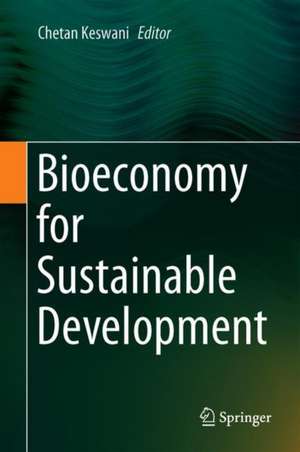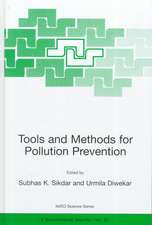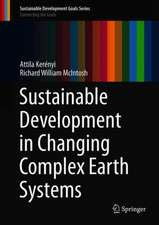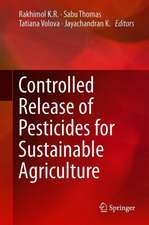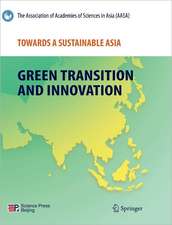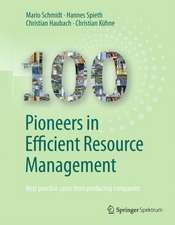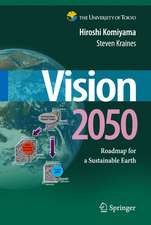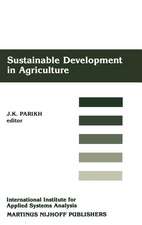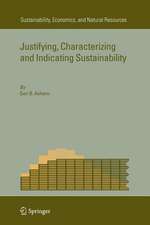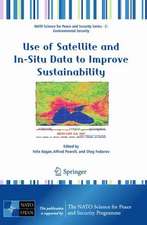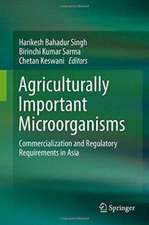Bioeconomy for Sustainable Development
Editat de Chetan Keswanien Limba Engleză Hardback – 25 oct 2019
The current era of incredible innovations has made science and technology one of the most powerful tools to meet the goals of incremental prosperity for humans and sustainable development. The development of the biotech industry in any given country is shaped by the characteristics of the technology—particularly its close relation to scientific knowledge—and by country-specific factors—the level and nature of the scientific knowledge base, the institutional set-up, and the role assumed by the government—which influence the country's ability to exploit new opportunities and appropriate the respective results.
This book presents an integrated approach for sustained innovation in various areas of biotechnology. Focusing mainly on the industrial, socio-economic and legal implications of biotechnological advances, it examines in detail not only the implications of IPR in omics-based research but also the ethical and intellectual standards and how these can be developed for sustained innovation.
Integrating science and business, it offers a peek behind the scenes of the biotech industry and provides a comprehensive analysis of the foundations of the present day industry for students and professionals alike.
The book is divided into three parts:
Food and Agricultural Biotechnology
Industrial Biotechnology
Pharmaceutical Biotechnology
| Toate formatele și edițiile | Preț | Express |
|---|---|---|
| Paperback (1) | 842.66 lei 38-44 zile | |
| Springer Nature Singapore – 25 oct 2020 | 842.66 lei 38-44 zile | |
| Hardback (1) | 907.15 lei 38-44 zile | |
| Springer Nature Singapore – 25 oct 2019 | 907.15 lei 38-44 zile |
Preț: 907.15 lei
Preț vechi: 1193.61 lei
-24% Nou
Puncte Express: 1361
Preț estimativ în valută:
173.60€ • 188.51$ • 145.83£
173.60€ • 188.51$ • 145.83£
Carte tipărită la comandă
Livrare economică 18-24 aprilie
Preluare comenzi: 021 569.72.76
Specificații
ISBN-13: 9789811394300
ISBN-10: 981139430X
Pagini: 392
Ilustrații: XIX, 388 p. 50 illus., 42 illus. in color.
Dimensiuni: 155 x 235 mm
Ediția:1st ed. 2020
Editura: Springer Nature Singapore
Colecția Springer
Locul publicării:Singapore, Singapore
ISBN-10: 981139430X
Pagini: 392
Ilustrații: XIX, 388 p. 50 illus., 42 illus. in color.
Dimensiuni: 155 x 235 mm
Ediția:1st ed. 2020
Editura: Springer Nature Singapore
Colecția Springer
Locul publicării:Singapore, Singapore
Cuprins
Chapter 1: Understanding Bioeconomy Systems: Integrating Economic, Organisational and Policy Concepts.- Chapter 2: Agrobiotechnology: Legal and Economic Aspects of Using GMOs in EU.- Chapter 3: Agricultural Biotechnology in the Philippines: Prospects and Challenges.- Chapter 4: Biological Control as Tool for Sustainable Development: Increasing the Distribution and Income Generation.- Chapter 5: Applications of remote sensing in pest monitoring and crop management.- Chapter 6: Biopesticides: Current Status and Future Prospects in India.- Chapter 7: From Genetic Modification to Gene Editing: Harnessing Advances in Biology for National Economic Development.- Chapter 8: Biotechnology Directive: A Major Step in Biotechnology Patent Law in Europe.- Chapter 9: Assessing the Emergence of Bioeconomy in Transition Economies By A Future-Oriented Approach - The Case of Poland.- Chapter 10: Enabling Bioeconomy with Offshore Macroalgae Biorefineries.- Chapter 11: Integrated Bio-Cycles System for Sustainable and Productive Tropical Natural Resources Management in Indonesia.- Chapter 12: Biosynthesized Secondary Metabolites for Plant Growth Promotion.- Chapter 13: Potential of bioeconomy in urban green infrastructure.- Chapter 14: Vaccines: Biotechnology Market, Coverage and Regulatory Challenges for Achieving Sustainable Development Goals.- Chapter 15: Achieving Sustainable Drug development through CSR: possibility or utopia.- Chapter 16: Function of the Medicinal Plants of the Mangroves in a Society of High Marginalization in Tabasco, Mexico.- Chapter 17: The Global Economic Impact of Neurodegenerative diseases: Opportunities and Challenges.- Chapter 18: Conjugated recombinant Proteins as emerging new drugs.- Chapter 19: Economic Importance of Medicinal Plants in Asian Countries.- Chapter 20: Chemotherapeutic Drugs and Gallbladder Cancer: Market Potential in India.
Notă biografică
Chetan Keswani is a Postdoctoral Fellow at the Department of Biochemistry, Institute of Science, Banaras Hindu University, India. He has keen interest in the intellectual property, regulatory and commercialisation issues of agriculturally important microorganisms. He is an elected Fellow of the Linnaean Society of London, UK. He received Best Ph.D. Thesis Award from the Uttar Pradesh Academy of Agricultural Sciences, India in 2015. He is an editorial board member of several reputed agricultural microbiology journals.
Textul de pe ultima copertă
The current era of incredible innovations has made science and technology one of the most powerful tools to meet the goals of incremental prosperity for humans and sustainable development. The development of the biotech industry in any given country is shaped by the characteristics of the technology—particularly its close relation to scientific knowledge—and by country-specific factors—the level and nature of the scientific knowledge base, the institutional set-up, and the role assumed by the government—which influence the country's ability to exploit new opportunities and appropriate the respective results.
This book presents an integrated approach for sustained innovation in various areas of biotechnology. Focusing mainly on the industrial, socio-economic and legal implications of biotechnological advances, it examines in detail not only the implications of IPR in omics-based research but also the ethical and intellectual standards and how these can be developed for sustained innovation.
Integrating science and business, it offers a peek behind the scenes of the biotech industry and provides a comprehensive analysis of the foundations of the present day industry for students and professionals alike.
The book is divided into three parts:
Food and Agricultural Biotechnology
Industrial Biotechnology
Pharmaceutical Biotechnology
Caracteristici
rapid innovation and collaborative mechanisms for knowledge sharing The only compilation available offering an Asian perspective on the long-term development of the bioeconomy Provides both background theory and practical guidance on regulatory issues Encourages the use of biotechnology to address global environmental issues by supporting international agreements to create and sustain markets for environmentally sustainable biotechnology products Analyses the long-term impacts of regenerative and personalized medicine on healthcare, including data confidentiality, new models for healthcare delivery Encourages implementation of flexible policies that can adapt to and support socially and economically beneficial disruptive biotechnologies Evaluates possible policy actions that could free up markets and access to knowledge, including encouraging public research institutions to adopt intellectual property guidelines that support
